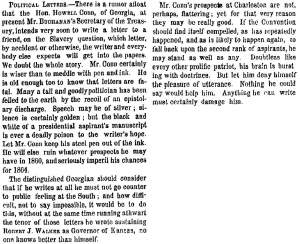Record Data
Transcription
The following text is presented here in complete form, as it originally appeared in print. Spelling and typographical errors have been preserved as in the original.
POLITICAL LETTERS. – There is a rumor afloat that the Hon. HOWELL COBB, of Georgia, at present Mr. BUCHANAN’S Secretary of the Treasury, intends very soon to write a letter to a friend, on the Slavery question, which letter, by accident or otherwise, the writer and everybody else expects will get into the papers. We doubt the whole story. Mr. COBB certainly is wiser than to meddle with pen and ink. He is old enough too to know that letters are fatal. Many a tall and goodly politician has been felled to the earth by the recoil of an epistolary discharge. Speech may be of silver; silence is certainly golden; but the black and white of a presidential aspirant’s manuscript is ever a deadly poison to the writer’s hope. Let Mr. COBB keep his steel pen out of the ink. He will else ruin whatever prospects he may have in 1860, and serious imperil his chances for 1864.
The distinguished Georgian should consider that if he writes at all he must not go counter to public feeling at the South; and how difficult, not to say impossible, it would be to do this, without at the same time running athwart the tenor of those letters he wrote sustaining ROBERT J. WALKER as Governor of Kansas, no one knows better than himself.
Mr. COBB’S prospects at Charleston are not, perhaps, flattering; yet for that very reason they may be really good. If the Convention should find itself compelled, as has repeatedly happened, and as is likely to happen again, to fall back upon the second rank of aspirants, he may stand as well as any. Doubtless like every other prolific patriot, his brain is bursting with doctrines. But let him deny himself the pleasure of utterance. Nothing he could say would help him. Anything he can write must certainly damage him.





